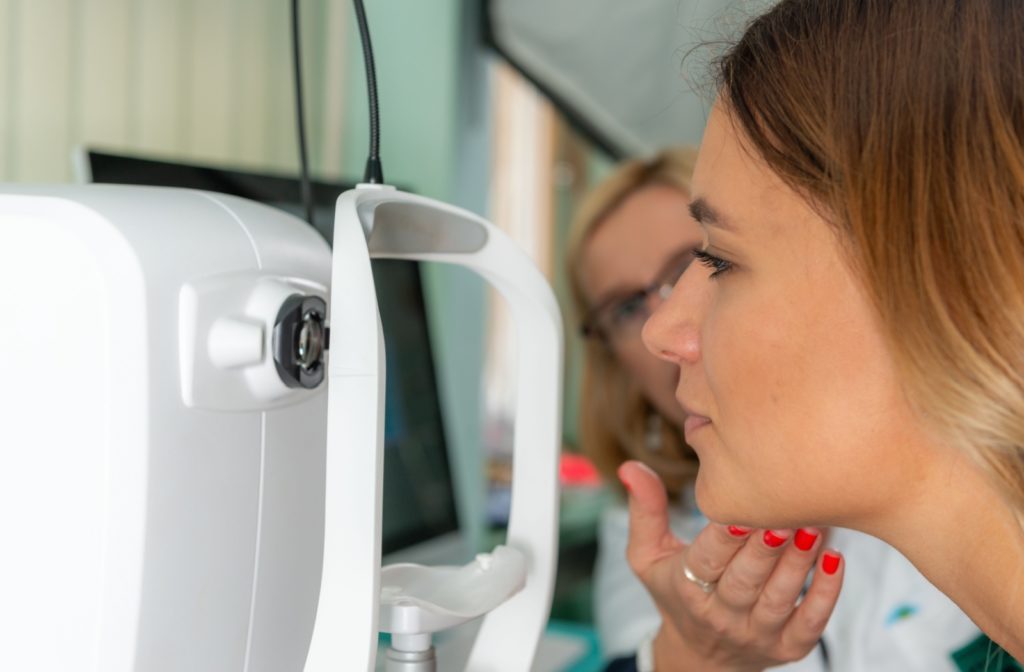Your eyes are unique, and they’re more complicated than most people think. Because of their complexity, they’re also vulnerable to all kinds of potential eye conditions and diseases. Fortunately, modern technology is making it easier than ever to detect these conditions before they cause any problems. And one such piece of technology? Something called “OCT scanning.”
OCT, or optical coherence tomography, is a machine designed to scan your eyes in detail. It’s key for catching conditions like glaucoma, macular degeneration, and corneal conditions. OCT scans give your optometrist incredibly valuable information about your eyes and their overall health.
What Does an OCT Scan Do?
Sometimes, eye conditions develop subtly. Some don’t show any obvious symptoms, while others can be easily mistaken for other, more minor problems. This can be problematic—many eye conditions can lead to permanent vision problems. This makes early detection essential, but how can optometrists catch these problems?
This is when OCT scanning stands out. An OCT scan captures highly detailed, cross-sectional images of your retina. It uses light waves to create a clear picture of the layers of your retina. This gives an eye care professional a detailed understanding of any changes in your eye’s structures.
The scan is particularly useful for measuring retinal thickness. OCT scans help track changes over time, which is a valuable way to monitor the progression of different eye conditions.
Is OCT Scanning Safe?
OCT scans are known for being safe and easy. The procedure is non-invasive, meaning there’s no direct contact with your eye. These scans don’t involve radiation, either—instead, they use light to create an image of your eye’s internal structures.
It’s also a comfortable procedure! OCT scans only require you to sit still and look into a specific device for a short time. It’s painless and quick, usually taking only a few minutes per eye.
Because there are no risks to OCT scans, they’re a great way to monitor your eye health. It’s a great step towards improved efficiency. These scans are invaluable!
Why Is OCT Scanning Important?
OCT scans are entirely safe and non-invasive. This means they’re extremely effective for catching complex eye conditions. They’re ideal for noticing the early signs of:
- Glaucoma, a condition where high internal eye pressure damages the optic nerve. OCT scans assess the health of the optic nerve and catch damage before it leads to vision loss.
- Age-related macular degeneration, a condition that deteriorates the central vision. OCT scans can detect early changes in the macula, allowing for timely treatment to slow progression.
- Diabetic retinopathy, caused by damage to the blood vessels in the retina. OCT scans reveal fluid build-up or abnormal blood vessel growth, aiding in effective management.
- Retinal detachment, which involves the separation of the retina from the underlying tissue. OCT scans help identify thinning or tears in the retina that can lead to detachment.
- Corneal defects or damage, where the thin tissue at the front of the eye is affected. OCT scans can detect thinning of the cornea or other abnormalities that may affect vision.
Early detection of these conditions makes all the difference. It prevents permanent damage to your vision and preserves your future quality of life. This makes OCT scanning a valuable tool for optometrists and patients alike.
Do All Eye Exams Use OCT Scans?
Here at Discover Eyecare, all of our eye exams include OCT scans. Eye exams with our team aren’t just about checking your prescription—they’re about watching for signs of anything wrong. We want to catch potential eye conditions long before they damage your vision, and OCT scanning is an incredible tool here.

During an eye exam with our team, we’ll work through plenty of other tests as well. These could include:
- Visual acuity tests to check how well you can see at various distances.
- Eye pressure tests to screen for glaucoma.
- Retinal exams and Ultra Wife Field imaging to evaluate the health of the back of your eye.
- Tests for colour vision and depth perception.
- General assessments of eye teaming and focusing abilities.
Together, these tests give us detailed information about your eye health. It helps us address potential problems and keep your vision clear—just like you deserve.
How Often Should You Book an Eye Exam?
Regular eye exams are a key part of an overall healthcare plan. They’re an easy way to catch problems in their earliest stages.
Ideally, you should:
- Schedule a child’s first eye exam by the age of 1.
- Schedule their second eye exam between 2-5 years, or as indicated after their first exam.
- Schedule annual eye exams for school-aged children between 6-19 years.
- Schedule a comprehensive adult’s eye exam every 2 years for adults aged 20 and older.
- Schedule a comprehensive diabetic eye exam at least once every year if diagnosed with diabetes (or any other previously diagnosed eye condition)
Sticking to a regular exam schedule helps keep your eyes healthy and vision clear. However, if you notice anything unusual, don’t ignore it.
OCT Scanning and Ultra Wide Field Imagine — It Makes a Difference
Your eyes deserve quality care, and regular eye exams are a great way to stay on top of your vision. OCT scans and Retinal Imaging are a great addition! They offer valuable insights that detect eye conditions long before they’re a serious problem.
At Discover Eyecare, we know the value of these OCT scans. That’s why we’re happy to use this technology to better care for your eyes. Book an appointment with us to see for yourself—it’s the first step towards a full understanding of your eye health.



